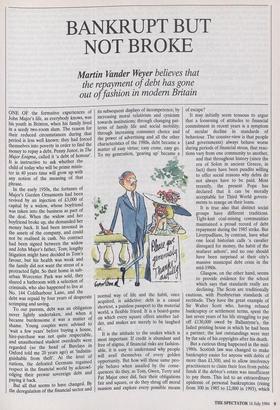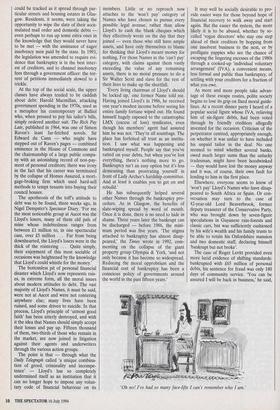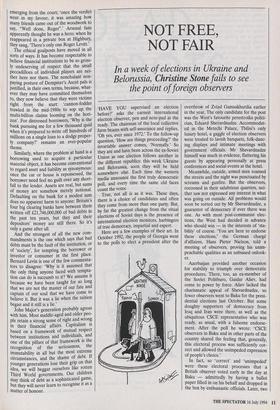BANKRUPT BUT NOT BROKE
Martin Vander Weyer believes that
the repayment of debt has gone out of fashion in modern Britain
ONE OF the formative experiences of John Major's life, as everybody knows, was his youth in Brixton, when his family lived in a seedy two-room slum. The reason for their reduced circumstances during that period is less well known: they had forced themselves into poverty in order to find the money to repay a debt. Penny Junor, in The Major Enigma, called it 'a debt of honour'. It is instructive to ask whether the child of today who will be prime minis- ter in 40 years time will grow up with any notion of the meaning of that Phrase.
In the early 1950s, the fortunes of Major's Garden Ornaments had been revived by an injection of £3,000 of capital by a widow, whose boyfriend was taken into the business as part of the deal. When the widow and her boyfriend broke up, she demanded her money back. It had been invested in the assets of the company, and could not be realised in cash. No contract had been signed between the widow and John Major's father, Tom; lengthy litigation might have decided in Tom's favour, but his health was weak and the family did not want the stress of a protracted fight. So their home in sub- urban Worcester Park was sold, they shared a bathroom with a selection of criminals, who also happened to live at No. 144 Coldharbour Lane, and the debt was repaid by four years of desperate scrimping and saving. To our parents, debt was an obligation never lightly undertaken, and when it became burdensome it was a matter of shame. Young couples were advised to 'wait a few years' before buying a house, hire-purchase was not quite respectable, and unauthorised student overdrafts were regarded (so the head of Barclays in Oxford told me 20 years ago) as 'indistin- guishable from theft'. At the level of nations, the defeated Germans regained respect in the financial world by acknowl- edging their prewar sovereign debt and paying it back. But all that seems to have changed. By the deregulation of the financial sector and its subsequent displays of incompetence; by increasing moral relativism and cynicism towards institutions; through changing pat- terns of family life and social mobility; through increasing consumer choice and the power of advertising and all the other characteristics of the 1980s, debt became a matter of easy virtue; easy come, easy go. To my generation, 'gearing up' became a normal way of life and the habit, once acquired, is addictive: debt is a casual shortcut, a painless passport to the material world, a flexible friend. It is a board-game on which every square offers another lad- der, and snakes are merely to be laughed at.
It is the attitude to the snakes which is most important. If credit is abundant and free of stigma, if financial risks are fashion- able, it is easy to understand why people will avail themselves of every golden opportunity. But how will those same peo- ple behave when assailed by the conse- quences: do they, as Tom, Gwen, Terry and Pat Major once did, face their obligations fair and square, or do they shrug off moral suasion and explore every possible means of escape?
It is true also that distinct social groups have different traditions. Tight-knit coal-mining communities maintained a proud record of debt repayment during the 1985 strike. But Liverpudlians, by contrast, have what one local historian calls 'a cavalier disregard for money, the habit of the seafarer ashore', and no one should have been surprised at their city's massive municipal debt crisis in the mid-1980s.
Glasgow, on the other hand, seems to provide evidence for the school which says that standards really are declining. The Scots are traditionally cautious, with Presbyterian standards of rectitude. They have the great example of Sir Walter Scott who, having refused bankruptcy or settlement terms, spent the last seven years of his life struggling to pay off £130,000 owed by Ballantyne's, the failed printing house in which he had been a partner; the last outstandings were met by the sale of his copyrights after his death. But a curious thing happened in the mid- 1980s. Scottish law was changed to make bankruptcy easier for anyone with debts of more than £1,500, and to allow insolvency practitioners to claim their fees from public funds if the debtor's estate was insufficient to pay them. This led to an extraordinary epidemic of personal bankruptcies (rising from 300 in 1985 to 12,000 in 1993), which could be tracked as it spread through par- ticular streets and housing estates in Glas- gow. Residents, it seems, were taking the opportunity to wipe the slate of their accu- mulated mail order and domestic debts — even perhaps to run up some extra ones in the knowledge that they would never have to be met — with the assistance of eager insolvency men paid by the state. In 1993, the legislation was amended to require evi- dence that bankruptcy is in the best inter- est of creditors, and to channel insolvency fees through a government officer: the tor- rent of petitions immediately slowed to a trickle.
At the top of the social scale, the upper classes have always tended to be caddish about debt: Harold Macmillan, attacking government spending in the 1970s, used as a metaphor his contemporary at Balliol who, when pressed to pay his tailor's bills, simply ordered another suit. The Rich Pay Late, published in 1964, was one of Simon Raven's least far-fetched novels. Sir Edward du Cann — who might have stepped out of Raven's pages — combined eminence in the House of Commons and the chairmanship of a large public compa- ny with an astonishing record of non-pay- ment of personal creditors; there was irony in the fact that his career was terminated by the collapse of Homes Assured, a mort- gage-broking firm which used hard-sell methods to tempt tenants into buying their council houses.
The apotheosis of the toff's attitude to debt was to be found, three weeks ago, in Nigel Dempster's Spectator Diary. 'For me the most noticeable group at Ascot was the Lloyd's losers, many of them old pals of mine whose indebtedness ranges from between £1 million to, in one spectacular case, over £5 million . . . Far from being downhearted, the Lloyd's losers were in the thick of the roistering . . . Quite simply, their enjoyment of this most sociable of occasions was heightened by the knowledge that Lloyd's could whistle for the money.'
The bottomless pit of personal financial disaster which Lloyd's now represents rais- es, in extreme form, all the moral issues about modern attitudes to debt. The vast majority of Lloyd's Names, it must be said, were not at Ascot and were not roistering anywhere else; many lives have been ruined, and some driven to suicide. In that process, Lloyd's principle of 'utmost good faith' has been utterly destroyed, and with it the idea that Names should simply accept their losses and pay up. Fifteen thousand of them, two-thirds of those who remain in the market, are now joined in litigation against their agents and underwriters through the various action groups.
The point is that — through what the Daily Telegraph called 'a unique combina- tion of greed, criminality and incompe- tence' — Lloyd's has so completely undermined itself as an institution that it can no longer hope to impose any volun- tary code of financial behaviour on its members. Little or no reproach now attaches to the 'won't pay' category of Names who have chosen to pursue every possible legal avenue, rather than allow Lloyd's to cash the blank cheques which they effectively wrote on the day that they joined — even those who still have ample assets, and have only themselves to blame for thinking that Lloyd's meant money for nothing. For those Names in the 'can't pay' category, with claims against them vastly exceeding the value of any remaining assets, there is no moral pressure to do a Sir Walter Scott and slave for the rest of their lives to make up the shortfall.
'Every living chairman of Lloyd's should be locked up,' one former Name told me. Having joined Lloyd's in 1986, he received one year's modest income before seeing his entire family fortune wiped out. He found himself hugely exposed to the catastrophic LMX (excess of loss) syndicates, even though his members' agent had assured him he was not. 'They're all scumbags. The place has forfeited all trust as an institu- tion. I saw what was happening and bankrupted myself. People say that you've ratted on your debts, but when you've lost everything, there's nothing more to go. Bankruptcy isn't an easy option but it's less demeaning than prostrating yourself in front of Lady Archer's hardship committee. And at least it enables you to get on and rebuild.'
He has subsequently helped several other Names through the bankruptcy pro- cedure. As in Glasgow, the benefits of slate-wiping spread by word of mouth. Once it is done, there is no need to hide in shame. Three years later the bankrupt can be discharged — before 1986, the mini- mum period was five years. 'The stigma attached to bankruptcy has almost disap- peared,' the Times wrote in 1992, com- menting on the collapse of the giant property group Olympia & York, 'and not only because it has become so widespread. Reducing the moral opprobrium and the financial cost of bankruptcy has been a conscious policy of governments around the world in the past fifteen years.' It may well be socially desirable to pro- vide easier ways for those beyond hope of financial recovery to walk away and start again. But the easier the system, the more likely it is to be abused, whether by so- called 'rogue directors' who stay one step ahead of their creditors by hopping from one insolvent business to the next, or by profligate yuppies who see the chance of escaping the lingering excesses of the 1980s through a cooked-up 'individual voluntary arrangement' (IVA), a convenient means, less formal and public than bankruptcy, of settling with your creditors for a fraction of what you owe.
As more and more people take advan- tage of these escape routes, polite society begins to lose its grip on fixed moral guide- lines. At a recent dinner party I heard of a popular social figure whose IVA, relieving him of six-figure debts, had been voted through by friendly creditors allegedly invented for the occasion. Criticism of the perpetrator centred, appropriately enough, on whether it was unfair to have included his unpaid tailor in the deal. No one seemed to mind whether several banks, owed much larger sums than the unlucky tradesman, might have been hoodwinked — they would have lost the money anyway and it was, of course, their own fault for lending to him in the first place.
Elsewhere, everyone seems to know of 'won't pay' Lloyd's Names who have disap- peared to South Africa or Spain. Or con- versation may turn to the case of 42-year-old Lord Beaverbrook, former deputy treasurer of the Conservative Party, who was brought down by seven-figure speculations in Guyanese rain-forests and classic cars, but was sufficiently cushioned by his wife's wealth and his family trusts to be able to retain his Oxfordshire mansion and two domestic staff, declaring himself 'bankrupt but not broke'.
The case of Roger Levitt provided even more lurid evidence of shifting standards: bankrupted with £65 million of personal debts, his sentence for fraud was only 180 days of community service. 'You can be assured I will be back in business,' he said, 'Oh no! I've had so many face-lifts I can't remember who I am.' emerging from the court; 'once the verdict went in my favour, it was amazing how many friends came out of the woodwork to say, "Weil done, Roger".' Arsenal fans apparently thought he was a hero: when he reappeared in a private box at Highbury, they sang, 'There's only one Roger Levitt.'
The ethical goalposts have moved in all sorts of ways. It has become respectable to believe financial institutions to be so gross- ly undeserving of respect that the small peccadilloes of individual players are nei- ther here nor there. The nonchalant non- paying posture of Dempster's Ascot pals is Justified, in their own terms, because, what- ever they may have committed themselves to, they now believe that they were victims right from the start: 'cannon-fodder trawled in the mid-1980s to sop up the multi-billion claims looming on the hori- zon'. For distressed borrowers, 'Why is the bank pursuing me for a few thousand quid When it's prepared to write off hundreds of millions on a single loan to a dodgy proper- ty company?' remains an ever-popular theme.
Similarly, where the problem at hand is a borrowing used to acquire a particular material object, it has become conventional to regard asset and liability as synonymous: once the car or house is repossessed, the borrower need feel no guilt over any short- fall to the lender. Assets are real, but sums of money are somehow merely notional. Defaulting on the bank for a modest sum does no apparent harm to anyone: Britain's four big clearing banks have between them written off £21,746,000,000 of bad debts in the past ten years, but they and their depositors' money are still there. So it's only a game after all.
And the strongest of all the new com- mandments is the one which says that bad debts must be the fault of the institution, or of 'society', for tempting the borrower or investor or consumer in the first place.
Bernard Levin is one of the few commenta- tors to disagree: 'Why is it assumed that the only thing anyone faced with tempta- tion can do is succumb to it? We assume it because we have been taught for so long that we are not the master of our fate and captain of our soul that we have come to believe it. But it was a lie when the tuition began and it still is a lie.' John Major's generation probably agrees with him. Most middle-aged and older peo- ple retain a strong sense of right and wrong in their financial affairs. Capitalism is based on a framework of mutual respect between institutions and individuals, and one of the pillars of that framework is the recognition of the seriousness, the immutability in all but the most extreme circumstances, and the shame of debt. If Younger generations lose their grip on that idea, we will beggar ourselves like rotten Third World governments. Our children may think of debt as a sophisticated game, but they will never learn to recognise it as a matter of honour.




















































 Previous page
Previous page